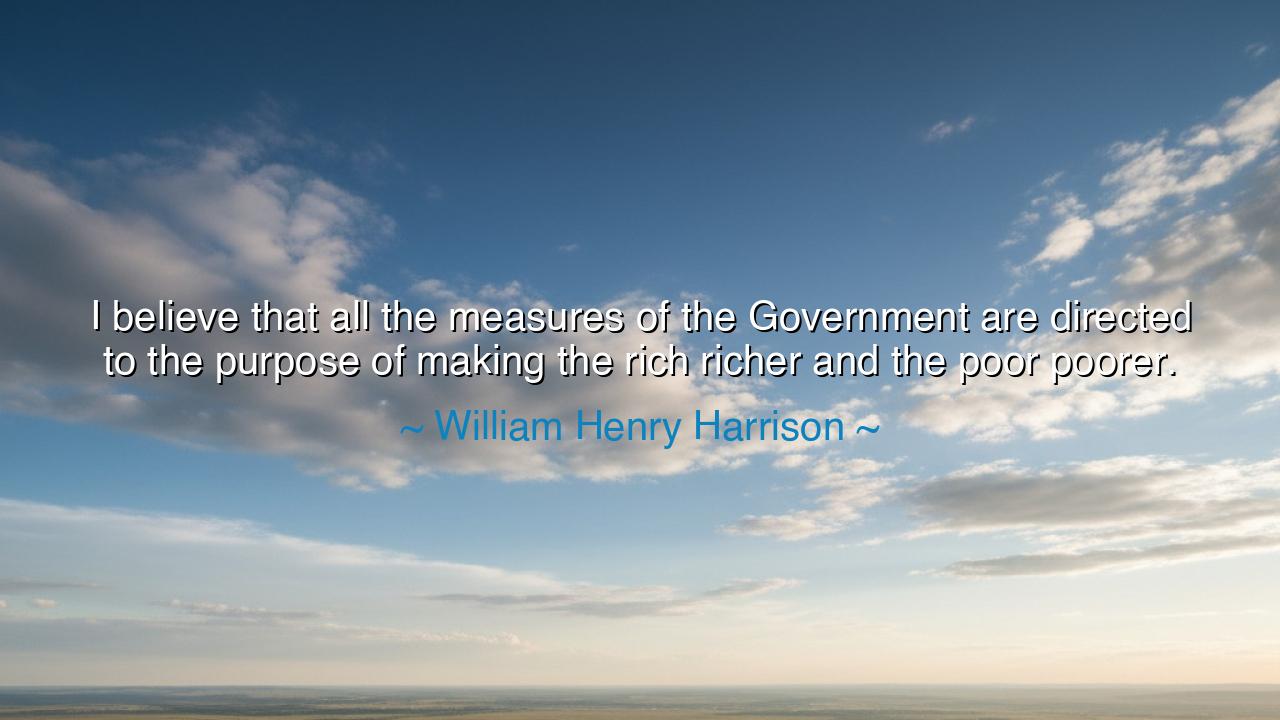
I believe that all the measures of the Government are directed to
I believe that all the measures of the Government are directed to the purpose of making the rich richer and the poor poorer.






The words of William Henry Harrison — “I believe that all the measures of the Government are directed to the purpose of making the rich richer and the poor poorer.” — strike like a bell in the stillness of history, calling forth both sorrow and defiance. In these few but piercing words, Harrison lays bare one of the oldest and gravest perils that haunts every nation: the corruption of power when it forgets its duty to justice. His cry was not one of envy, but of warning — that when government bends to serve privilege rather than principle, when its laws enrich the few and burden the many, the foundations of liberty begin to crack.
The origin of this quote lies in the troubled years of early America, a time when the republic, though young and full of promise, was already shadowed by inequality. Harrison, who would one day ascend to the presidency, spoke as a man who had seen both frontier hardship and political ambition. The nation was then gripped by fierce debate over banks, monopolies, and the growing influence of wealthy elites upon public policy. Harrison, though of noble birth himself, saw clearly that unchecked economic power had begun to twist the purpose of government — that the people’s house was no longer the people’s servant, but the servant of money.
His words are prophetic, for they speak to the eternal struggle between justice and greed, between the spirit of equality that builds nations and the spirit of privilege that destroys them. To say that government’s measures “make the rich richer and the poor poorer” is to accuse it of betraying its sacred trust. The true purpose of government, Harrison implies, is not to favor any class, but to safeguard the rights and dignity of all. When rulers forget this and legislate for wealth instead of worth, they transform the republic into an engine of oppression — gilded on the outside, but hollow within.
History offers us many mirrors of this truth. Consider the ancient city of Athens, birthplace of democracy. In her early glory, the city was guided by the laws of Solon, who balanced the scales between rich and poor, giving each man a voice in the assembly. But as generations passed, wealth pooled in the hands of a few, and the common people sank into debt and despair. When the powerful used the law to guard their fortunes instead of justice, the city grew weak. It was not foreign armies but internal greed that brought down her splendor. The poor, disillusioned, turned upon their leaders, and democracy fell into tyranny. Thus has it been in every age: when inequality hardens, freedom withers.
Harrison’s warning is not an attack upon prosperity, but a defense of moral balance. For wealth, when earned through honest labor and guided by conscience, strengthens a nation. But when it becomes the measure of virtue, and when those in power twist the law to preserve their advantage, society becomes a pyramid built upon suffering. The rich grow isolated in luxury; the poor grow bitter in toil. Between them stretches a gulf that no policy can bridge — save the rediscovery of justice and compassion.
The wisdom of this quote reaches far beyond its century. Even in our own time, we see governments tempted by the same folly — to favor corporations over communities, to grant comfort to the powerful while denying the powerless their due. The faces and names may change, but the sin remains the same: the love of privilege over the love of people. Yet Harrison’s words also remind us that the cure lies not only in laws, but in the hearts of citizens. For when the people demand righteousness, rulers cannot long remain corrupt.
The lesson, therefore, is eternal: a just government serves the common good, not the wealth of a few. It must uplift the humble, protect the laborer, and ensure that opportunity flows not upward to privilege alone, but outward to all who strive. And if such a government fails to do so, the people must reclaim its purpose — not through anger or envy, but through wisdom, courage, and unity. Each generation must renew the covenant between the governed and the governors, between wealth and work, between freedom and fairness.
So let these words of William Henry Harrison be carved upon the conscience of all who rule and all who follow: Power must serve virtue, or it will serve greed. Let every citizen, rich or poor, remember that justice is not the enemy of prosperity, but its foundation. When governments remember this truth, nations flourish; when they forget it, they crumble. For a people divided by wealth will never be united in purpose, and a government that serves the few will soon lose the faith of the many. And in that loss, as history ever shows, lies the ruin of republics and the rebirth of tyranny.






AAdministratorAdministrator
Welcome, honored guests. Please leave a comment, we will respond soon